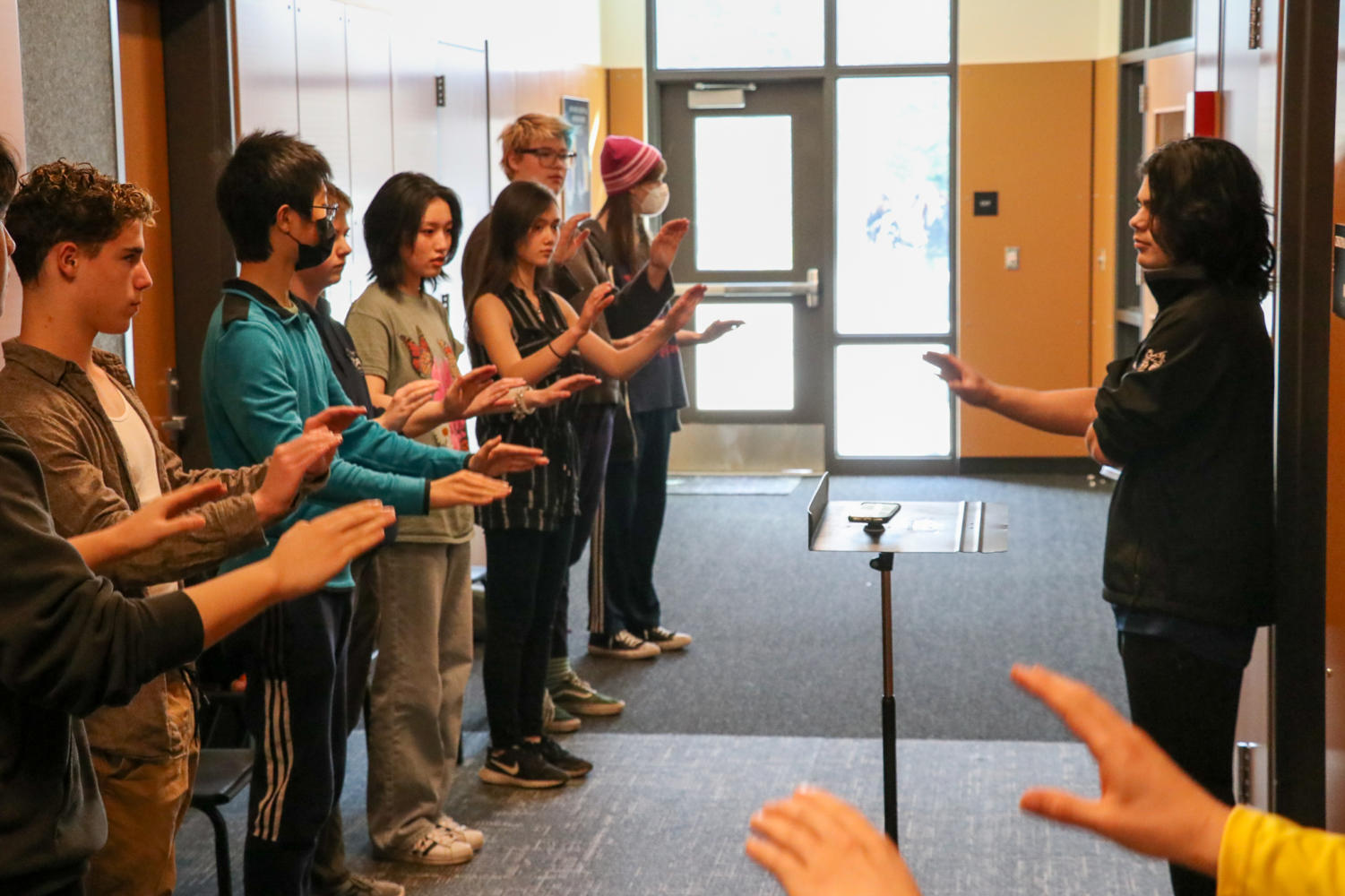During football games, pep rallies and assemblies, two people furiously waving their hands are visible at the head of the band — the drum majors. The drum majors play an essential role in keeping the band on tempo while playing music. Typically, there are two drum majors: a senior and a junior.
“We’re basically junior band directors. We’re conducting for the band most of the game, and we’re leading them through the entire thing,” said junior drum major Nye Mabale (he/him). “You also get to do some fun baton work and other things like that.”
In addition to their musical responsibilities, drum majors also play a crucial role in leadership. Mabale said that the drum majors take some responsibility off of the band directors — Charlie Fix and Bruce Wilson — for taking care of the band.
“We have our planning for the school year: what music we’re playing, how we’re playing that music, keeping the band in check — even though it can get a little bit wild sometimes — and making sure that everything we’re doing is good, and we’re actually having fun,” said Mabale. “If the band isn’t behaving, me and Samay [the senior drum major] are in control of making sure that they’re doing the right thing and representing Inglemoor in the right way.”
After each school year, a new drum major replaces the graduating one. Every February, many sophomore band members attempt to take on this leadership role and sign up for the drum major training, which eventually leads to the drum major auditions. One of these sophomores, Elizabeth Wang (she/they), was willing to try it out.
“Ever since freshman year, during marching season, I was really inspired by our senior drum major, who was Ben Rasmussen at that time, and also Samay,” said Wang. “I’ve also always been really involved in band, and I love band, so I thought [it] would be a great opportunity for me.”
This four-month course prepares potential drum majors for the difficult, time-consuming and stressful job of leading the band. Drum major training happens every week and is divided into four parts. The first is the introduction, where the trainees get to introduce themselves and meet their fellow competitors.
“The second part is where we basically project our voices and then shout out commands that the band follows,” said sophomore Kairui Cheng (he/him). “The third part is conducting, which is basically keeping time for whenever we’re playing, and we’ll be learning how to conduct properly.”
The fourth and final stage, the audition, is where participants perform a drum major’s commands and conduct in front of the entire band. After they finish, band members get to ask each potential candidate questions. The three band directors and the two current drum majors then individually interview each potential candidate.
Each portion of the audition is considered, but ultimately, the junior drum major has the most say in who their next partner will be. The results of the auditions and the new co-leader of the band is revealed at the end of the school year.
“At the very last concert, the Pops Concert, which is when we play fun music and we have much more things for seniors and all that kind of thing, me and Samay will both do a speech, and during my speech, I will announce the next drum major. That will be in May or June,” said Mabale.
Cheng said that even if he isn’t chosen as drum major, the training has still had a positive effect on him. He said that itthe training will provide him with a wealth of experience and knowledge that he can use throughout his life.
“It’s a chance to learn more about how this process works and a chance for me to learn about myself a little bit more too,” said Cheng. “It’s also a learning experience for me as well, teaching myself how to become a better person since it will really push me out of my comfort zone.”
Becoming drum major is an excellent opportunity to bring positive change to the band. Mabale says that while he believes Inglemoor’s band is the best marching band in the district, there’s still room for improvement. He believes the upcoming junior drum major will be able to help with that.
“Having new faces and new ideas and inspirations is always good,” said Mabale.
Some trainees have already voiced ideas for improving the band next year. Wang said that she wants to establish better communication between band members so they can freely express their ideas. She also wishes to welcome new band members as they adjust to the demanding marching season.
“I understand that marching season can be really overwhelming in terms of time management as well as just learning how to march and play at the same time, but also to make returning members feel welcome at the same time,” said Wang.
Additionally, Cheng wants to change the amount the band plays at football and basketball games; the band doesn’t play much during those. He explained how the band could take inspiration from Bothell High School, which does shorts, a small piece that members memorize to play quickly during timeouts.
These sophomores will go through many hours of training and hard work, but in the end, only one will become the next drum major.
“I [still] think it’s a great learning opportunity,” said Cheng. “And even if I don’t become drum major, which is very likely, I will still have a lot of experience and knowledge to apply in future scenarios, even outside of high school.”


















